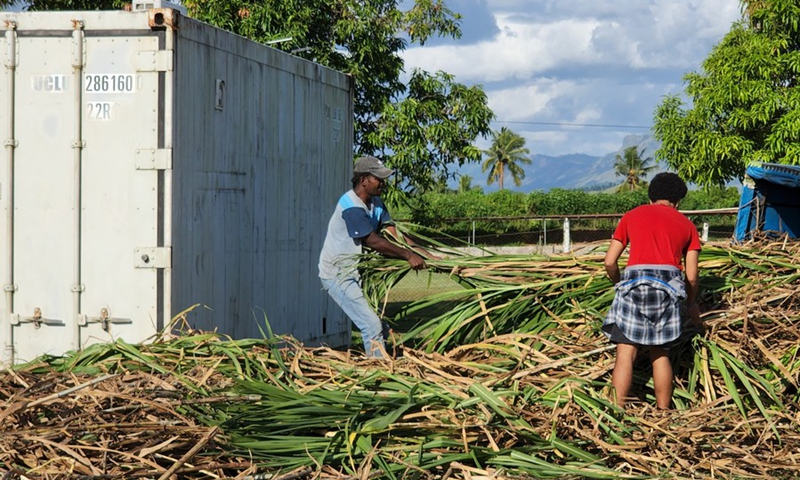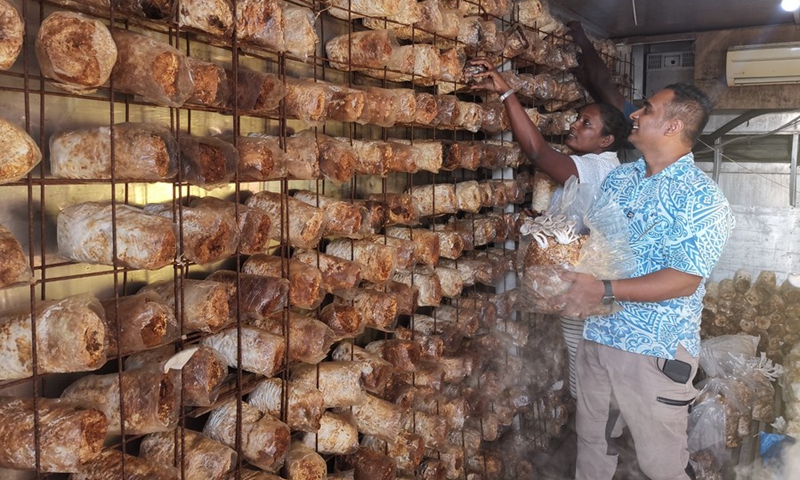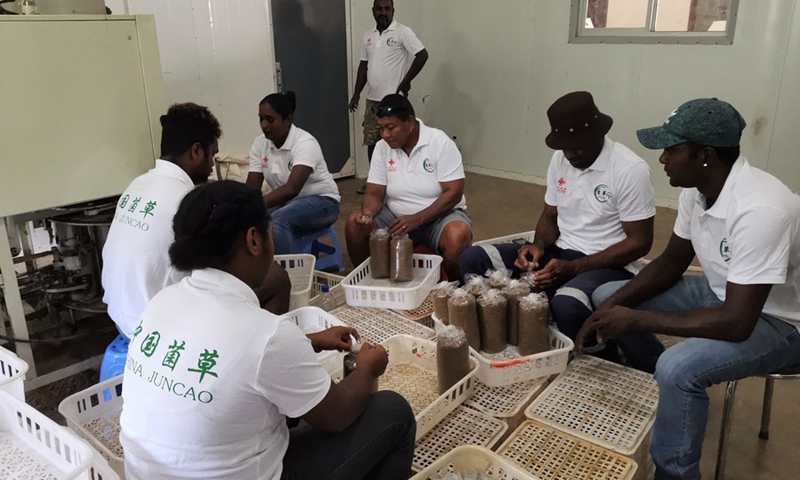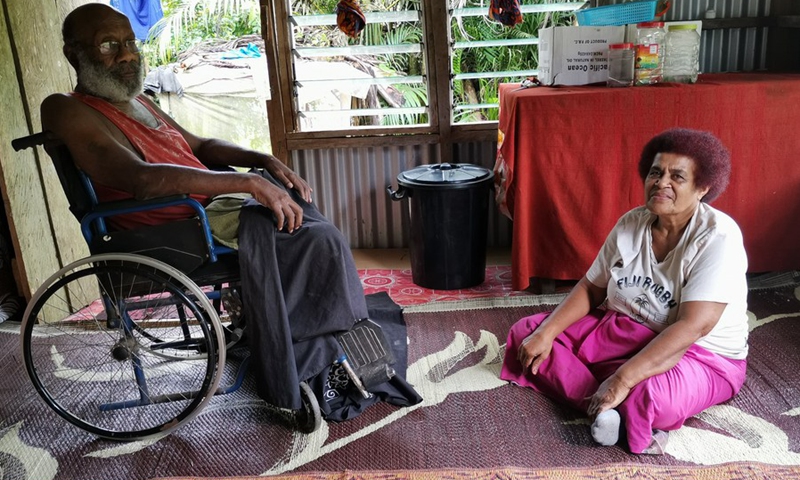
Employees of Bula Mushroom company unload Juncao from a vehicle in Nadi, Fiji, May 11, 2022.(Photo: Xinhua)

Staff members of Bula Mushroom company check the condition of mushrooms in Nadi, Fiji, May 11, 2022.(Photo: Xinhua)

Photo taken on Feb. 17, 2021 shows employees working at the Juncao demonstration center in Nadi, Fiji.(Photo: Xinhua)

Marika Uluinacera (L), a 68-year-old disabled man who plants mushroom, is seen during an interview with Xinhua at home in Serea village of Naitasiri province, Fiji, May 19, 2022.(Photo: Xinhua)
China's Juncao project has been benefiting Fiji since 2014 when it was introduced in the Pacific island country, Fijian officials and farmers said.
The Juncao technology, literally meaning fungi and grass, was invented in the 1980s by Lin Zhanxi, a professor at China's Fujian Agriculture and Forestry University, who is also the chief scientist for the China-Fiji Juncao Technology Cooperation Project launched in 2014 after the Chinese and Fijian governments signed an agreement to start agricultural cooperation.
In Fiji, Juncao has become popular as "the happy grass from China" after the two phases of the project have witnessed a sound success. Now the third phase of the project will be implemented as scheduled.
Lin Zhansen, head of the Chinese experts team based in Nadi, the third largest city of Fiji, told Xinhua that Juncao has been warmly welcomed in Fiji, as it not only helps develop a low-cost mushroom cultivation industry, but also produces cattle feed and minimizes soil erosion in the island nation.
"The Juncao project is a low cost one with quick rewards and it has benefited many ordinary Fijians," he said.
According to Lin, the Chinese experts have so far trained 1,704 Fijians, including female farmers, disabled persons and even tour managers who lost their jobs due to COVID-19 pandemic. In addition, they have sent 45 officials of Fiji's Ministry of Agriculture and technicians to be trained at China's Fujian Agriculture and Forestry University.
The country currently has more than 600 mushroom farmers and Lin's team has helped establish two model villages of mushroom cultivation in Fiji.
Mushroom cultivation is a new concept in Pacific countries like Fiji and not many people know how to grow or use them before the introduction of the Juncao technology to Fiji. The technology enables farmers to grow several types of nutritious mushrooms from dried, chopped grasses, instead of trees or woods, giving them a stable source of income thereby helping boost their livelihoods.
Fiji imports more than 120 tons of mushroom annually. There is an existing demand for the commodity, and increasing popularity is seen in local markets, namely supermarkets and restaurants.
"I believe that Fiji has a great potential of mushroom growers in the years to come," Lin said.
Tagiyaco Vakaloloma, 28, is a senior technical assistant for mushroom research and development from Fiji's Ministry of Agriculture. she hailed the Juncao project and expressed gratitude to China.
"It has benefited our people in their living and produces cattle feed," Vakaloloma said.
Seruwaia Kabukabu, 44, is a famous female entrepreneur in Serea village of Fiji's Naitasiri province. Owning a dairy farm with 50 cattle, she has improved her family's livelihood through profit from mushroom cultivation since 2019, after being trained at the Juncao demonstration center in Nadi.
"Mushroom is easy to grow, highly nutritious, with a high market value. The mushroom farming is more suitable for women as it entails less intensive labor and could provide a consistent source of income to support our families," she said, adding, "I have used the money to buy refrigerator, blender, straw mats and etc. I also have built a new toilet and bathroom for our family."
The woman encouraged her fellow villagers to follow suit.
With her help, 68-year-old Marika Uluinacera, a disabled man and 15-year-old Vilimaina Nokonokosere, a school student, had also planted mushroom. The latter bought herself a new pair of school uniform, bag and new pair of sandals with the money she gained from selling mushroom. Local press reported the girl's story of planting mushrooms for her school needs.
Describing it as "a very good project," Kabukabu said that she wanted to thank the Chinese government and the Chinese people for the project which enables Fijian women to have a better life.
Kabukabu said that she, along with her fellow villagers, will do more mushroom cultivation in the years to come.
Sunita Vikashni Lata, 39, is a Fijian farmer who lives in the Lomawai village, about 45 km from Nadi. she really appreciated the chances for being trained twice in China's Fujian province and working for the Juncao demonstration center for five years. She also cultivated mushroom in her spare time.
She told Xinhua that the income from the salary and mushroom cultivation has helped her pay electricity and water bills, and buy TV, freezer and kids needs.
Chaya Kumar and Vinit Lal, a couple, have recently launched their Bula Mushroom company in the Nadi-based Vocational School of Agriculture, Votualevu College. This made the school the first in the nation to include technical teaching in mushroom cultivation.
The couple told Xinhua that they have produced around 200 kg of fresh mushrooms that have been sold to supermarkets and restaurants.
"We have good market demand here for mushroom, we are doing well and hope to expand our business, even export our mushroom in the near future," they said, adding "We want to thank China for the Juncao project and the Chinese experts team's training for us."
Chinese Ambassador to Fiji Qian Bo told media that China's assistance to the Pacific island countries like Fiji is to "meet their urgent needs, to teach a man to fish and feed him for a lifetime, and to promote their capacity building."
"There is no doubt that the Juncao project is a great success as it has provided a new way with ecological and economic benefits for environmental protection, employment improvement and poverty alleviation," he said.
